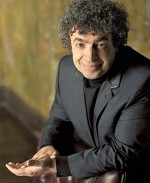Title
During the month of October, Russian conductor Semyon Bychkov will take New York by storm, conducting Verdi’s Otello at the Metropolitan Opera, the Met Orchestra at Carnegie Hall, and the Juilliard Orchestra’s season opener on October 24 at Alice Tully Hall.
Body
Having recently been appointed the Klemperer Chair of Conducting at London’s Royal Academy of Music, Bychkov is very enthusiastic about working with the students in this, his debut with the Juilliard Orchestra. “Everything they play, they tend to play for the first time so it is always a discovery. It’s exciting, it’s challenging, it’s overwhelming sometimes, but it is extremely rewarding in the way that only something that one does for the first time can be,” he said in a phone interview with The Journal. Bychkov also noted that in seeing students make these new discoveries, he is forced to re-evaluate his own impressions of the music: “it’s a two-way street and a most enriching, rewarding process.” This process of discovery will likely be most widespread for the first piece on the program, Métaboles by French composer Henri Dutilleux.
Composed in 1964 for the Cleveland Orchestra’s 40th anniversary, Métaboles is a work in five parts that represents metamorphosis and evolution. Various parts highlight different sections of the orchestra, making it something of an orchestral concerto. This quantity of exposed solos can be a challenge, but luckily, Bychkov said, he knows the piece inside and out from having had the chance to consult with the composer about the work. Noting that Dutilleux doesn’t live far from him, in Paris, Bychkov went to see him before recording the piece with the Orchestre de Paris, where he was music director from 1989 to 1998. “We talked about the piece and there was an opportunity for me to ask him lots of questions from the score—how to go about it and how to interpret it and articulate it, how to phrase it—and the answers that he gave me were very clear and extremely helpful,” he said.
Obviously, Bychkov didn’t have that luxury in studying Brahms’s Symphony No. 4, another of the featured works on the Juilliard program, yet he feels just as connected to the work. The first orchestral piece that Bychkov ever conducted, in his audition for the St. Petersburg Conservatory (then the Leningrad Conservatory), was a Brahms symphony—the first. “This is just to give you an idea of how important this music has been throughout my life,” said Bychkov, who has recorded all four Brahms symphonies with the WDR Symphony Orchestra Cologne.
Rachmaninoff’s Rhapsody on a Theme of Paganini, a piece for solo piano and orchestra, rounds out the program. It consists of 24 variations on Nicolò Paganini’s 24th Caprice for solo violin and was written in 1934. The addition of this piece to a program creates a concert that will represent a variety of cultures. “What I think is a great challenge for us today is to show how distinct those cultures are,” Bychkov said. “We can’t make Dutilleux sound like Brahms or Brahms sound like Dutilleux. It has to be a very specific representation of each composer and the period in which the music was born, and that is a challenge not only for students, it’s a challenge for those who have been making music their whole life.”
One overarching idea Bychkov plans to focus on during his time at Juilliard is idealism. When working with students, he stressed, it’s important to preserve their idealism about a future in music, something that can easily fade with musicians once they graduate. “The most important thing that I can share is that it is possible to go through quite a lot of years of making music, which I have had by now, without losing this idealism,” he added. In this he hopes to lead by example. “Each one of them will look at you and think ‘well, this is possible for me too,’ and that’s exactly what we need from them.”





